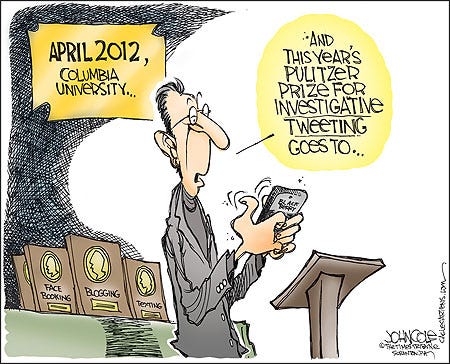Alejandro Figueroa
af297616@ohio.edu
Fact: The changing nature of journalism will never allow it to go back to a time when the news was simply something controlled by those who delivered it. Of course, the news does not and has not belonged to those who write it, it's for the sake of the public, and the sake of truth and information.
But why reminisce about the past? In retrospect, the digital age of social media, the internet, and fast-paced reporting have made journalism itself more important and dynamic. Through this evolving chain of events, newsrooms have had to adapt to be more accountable, accurate and truthful than ever before. These values, paired with principles of ethics are what will be pushing the future of journalism itself as it figures out how to adapt in an age when anyone can participate in having a voice.
(Image source: John Cole, The Times-Tribune, Scranton, Pennsylvania)
In truth, social media has changed journalism in ways thought to be impossible maybe a decade or two ago. It has made journalism faster, easier to distribute and more personal, as noted by an article written by Recode Senior Editor, Kurt Wagner.
This results in a double-edged sword, for once, it makes news and information easier to spread and easier to cover breaking news, important things that otherwise people wouldn’t have known about if not for the use ofsocial media. On the opposite end, fast news doesn’t always equal accurate, mistakes happen more often, and thus, the cycle of distrust begins.
But the internet—social media more specifically— doesn’t have to be some sort of convoluted place where all trust and reason is lost. Of course, the technology is only as good as the person who uses it, so developing a set of ethical guidelines would be a good start in navigating this changing landscape.
Recent studies by the Cision Global Social Journalism Study have shown that around 73 percent of journalists reported using social media for their work daily, among other statistics, 47 percent reported using social media to interact with their audience.
This proves two things: One, the data is available to show the many ways in which journalists engage in social media and how they use it. Two, it shows that there is a driving factor and wants to use social media for a more present, more connected relationship between the audience and the writer.
So, it’s not about saying that social media is evil and destroying the very fabric of journalism, it's yet another variable in the intricate, dynamic, and the ever-changing nature of journalism.
Instead of criticizing a tool of communication, coming back to the latter, applying principles of ethics would then be the answer. Now, more than ever is an important time to have a conversation about ethics not only for journalists but for the audience as well. As social media becomes more interactive, it is imperative that those who participate identify what is ethical and what is not, and in doing so, understanding the guidelines will hopefully result in a balance of harmony in more truthful, reliable and accurate journalism.

No comments:
Post a Comment